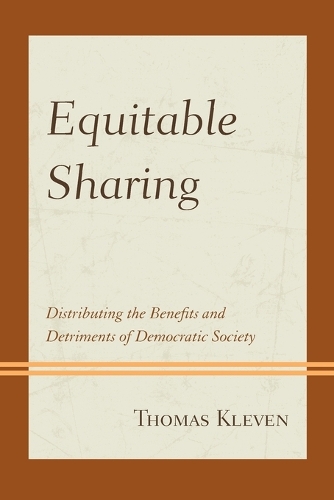
Equitable Sharing: Distributing the Benefits and Detriments of Democratic Society
(Paperback)
Publishing Details
Equitable Sharing: Distributing the Benefits and Detriments of Democratic Society
By (Author) Thomas Kleven
Bloomsbury Publishing PLC
Lexington Books
25th August 2015
United States
Classifications
Tertiary Education
Non Fiction
Government powers
Social and cultural anthropology
320.473
Physical Properties
Paperback
246
Width 156mm, Height 228mm, Spine 18mm
381g
Description
Equitable Sharing: Distributing the Benefits and Detriments of Democratic Society argues that a principle of equitable sharingone that requires the benefits and detriments of social life to be fairly distributed among all members of societyis fundamental to the concept of democracy and is implicit in the founding documents of the democratic society the United State purports to be. To illustrate the centrality of equitable sharing to democracy, this book examines the political philosophies of John Locke, John Stuart Mill, and John Rawls. Lockes libertarianism, Mills utilitarianism, and Rawls egalitarianism represent major strains of Western democratic theory, and all contain a principle of equitable sharing in some form. To illustrate the centrality of equitable sharing to U.S. society, the book examines the Declaration of Independence and the Constitution. While these documents do not set forth a particular version of equitable sharing, they contain elements of all of Lockes, Mills and Rawls philosophies and evidence a commitment to equitable sharing as fundamental to the democratic society they contemplate. The task of U.S. society throughout its existence has been to engage in an on-going dialogue that gives life to the commitment to equitable sharing set forth in its founding documents. As the elected representatives of the people and the repository of the powers through which to implement much of what equitable sharing requires, the primary responsibility for implementation rests with the legislative branch. This book argues that the Supreme Court, interacting with the public and the legislature, also has a meaningful role to play in the dialogue over the requirements of equitable sharing and can play this role in a manner consistent with democratic principles. This point is illustrated through a discussion of several contemporary issues: same sex marriage, racial integration in public schools, health care, and the regulation of the electoral process.
Reviews
Equitable Sharing holds democratic societies to the ideal and building on the work of John Locke, John Mills, and John Rawls, contends that a truly democratic society must ensure that social benefits and detriments are fairly distributed among all its members. This breath-taking observation is carefully scrutinized in a practical as well as theoretical matter in a clear, concise, and persuasive way. This ambitious book thoughtfully analyzes the relative roles of the courts (including the Supreme Court) and the legislature in bringing about the ideal of equitable sharing. Any person interested in social justice for American societyand societies generallymust read Equitable Sharing. -- Kevin Johnson, University of California, Davis
Constitutional law sorely needs the fresh, judicious, and visionary thinking this book offers. It develops a compelling framework showing how equality is necessary to basic ideals of freedom and democracy. Equitable sharing has potential to outshine the similarly broad fundamental principles that have held sway over U.S. legal theory and doctrine in recent years, such as federalism or economic efficiency. The book astutely shows how equitable sharing can improve analysis of many current controversies, including affirmative action, campaign finance, same-sex marriage, and health insurance reform. -- Martha McCluskey, State University of New York at Buffalo
A wonderful book that should be read by all who care about social justice. Professor Kleven explains the concept of equitable sharing and why it is essential for a just society and what it would mean. In a world with a growing gap between haves and have nots this book provides a brilliant progressive path forward. -- Erwin Chemerinsky, University of California Berkley Law School
Kleven makes three related claims: the principle of equitable sharing 'all the benefits and detriments of social life must be fairly distributed among members of society'is fundamental to the concept of democracy; the principle is implicit in America's founding documents; and the principle requires a right to same sex marriage, use of race in assigning students, and laws guaranteeing equal opportunity to participate in the electoral process, among others. Kleven argues that the principle was violated when the Court overturned campaign finance spending limits in Citizens United v. FEC, and when it prevented Congress from withholding Medicaid funds from states that opt out of the Affordable Care Act's expanded Medicaid requirement. . . .Is the reductio ad absurdum of the equitable sharing principle Kurt Vonnegut's 'Harrison Bergeron' . . .[T]he work does address one of the central issues facing US democracy. Summing Up: Recommended. General readers, upper-division undergraduate students, and graduate students. * CHOICE *
Author Bio
Thomas Kleven is professor of law at Thurgood Marshall School of Law.
